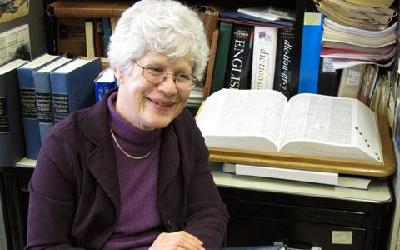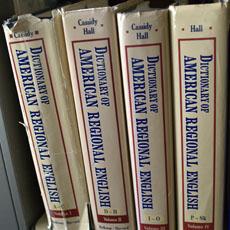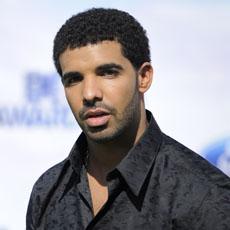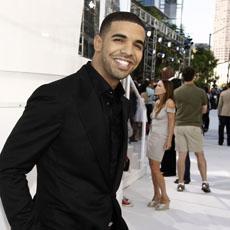分享到

JUNE SIMMS: Welcome to AMERICAN MOSAIC in VOA Special English.
(MUSIC)
I'm June Simms. This week on our program, we have music from Drake ...
We also look at the history of the world's best-known American word ...
But first we tell you about some terms in American English that not even all Americans would know.
(MUSIC)
Dictionary of American Regional English
JUNE SIMMS: In your country, are there terms that only people from your area can understand? Local language may be meaningless to outsiders without a special dictionary, like the Dictionary of American Regional English. As Barbara Klein reports, the fifth and final volume of the dictionary known as DARE has just been published.
BARBARA KLEIN: Joan Houston Hall is the chief editor of the Dictionary of American Regional English. She says DARE includes words, phrases, pronunciations and even grammar and syntax that differ from one part of the country to another.
JOAN HOUSTON HALL: "That strip of grass between the sidewalk and the street can be the parking strip, the parking, the parkway, the berm, the terrace, the tree lawn, the tree belt, the tree box, and the verge and the swale and other things, too. It's amazing to see the tremendous variety of terms used for the same thing."
BARBARA KLEIN: In some parts of the country, a carbonated soft drink is known as a soda; in others, people call it pop. Some Americans cook with what they call a frying pan; others call it a skillet. And a party where everyone brings food is either a potluck or a pitch-in.

Work on the Dictionary of American Regional English began in 1965 under Frederic Cassidy. He was an English professor at the University of Wisconsin-Madison. He and a team of 80 researchers traveled across the United States to document words used by Americans to describe their daily lives.
The first volume, A to C, was released in 1985. The final volume starts with slab, a term for a concrete road, and ends with zydeco, a kind of music popular in Louisiana.
Joan Houston Hall showed the final volume at a meeting of the American Dialect Society in January. Linguist Ben Zimmer writes about language for the Boston Globe and recalls the excitement.
BEN ZIMMER: "People just wanted to touch it like it was the holy relic or something."
BARBARA KLEIN: The Dictionary of American Regional English contains almost 60,000 words and terms that offer a linguistic tour of America. One word we liked is honeyfuggle. It means to cheat or trick. The earliest uses were found in the 1800s in the South.
(MUSIC)
The Story of OK
JUNE SIMMS: Next we turn to the story of an American word that began in Boston, Massachusetts, and spread around the world. "OK" started as a joke in 1839 -- and, no, we're not honeyfuggling you.
Our listener question this week comes from Stirlitz, an English teacher in Cuba. She wants to know the true origin of OK. She says, "I have five different versions but I don't know which one to pick."
Well, a couple of years ago, VOA's Avi Arditti and Rosanne Skirble talked with Allan Metcalf. He wrote the book "OK: The Improbable Story of America's Greatest Word." And, he says, not just the greatest word.
ALLAN METCALF: "America's most important word. The most successful American export to the rest of the world. And also an embodiment of the American philosophy, the American way of thinking."
AA: "All this, packed into two letters."
ALLAN METCALF: "Yes, that's the beauty of it and that's the economy of it. One of the two aspects of the American view of the world is pragmatism, getting things done. Even if they're not perfect, they're OK. And the nice thing about OK is it doesn't imply that everything is perfect or beautiful or wonderful. In fact, it's a neutral affirmation. When you say 'That's OK' or someone asks you 'How are you?' and you say 'I'm OK,' it doesn't mean that you're in perfect health. But it also doesn't mean that you're sick.
RS: "O-K are just two letters of the alphabet. Do they stand for something?"
ALLAN METCALF: "Well, they do, as a matter of fact. One of the curious things about OK that makes it require a whole book to tell its story is that it began as a joke. It was on March 23rd, 1839, in a Boston newspaper, that the newspaper first used 'o.k.' and explained those as an abbreviation for 'all correct.' And, of course, the joke was that 'o' is not the beginning of 'all' and 'k' is not the beginning of 'correct.' So this thing supposedly all correct was not all correct."
JUNE SIMMS: At that time, Boston newspapers were publishing all sorts of abbreviations that were meant to be funny. Most of these disappeared.
ALLAN METCALF: "But it turns out that in the next year, 1840, in the American presidential election of 1840, a man named Martin Van Buren was running for re-election. He happened to come from Kinderhook, New York, and so somebody thought of calling him 'Old Kinderhook' and then thought of founding clubs supporting him throughout the country, called OK Clubs. OK, Old Kinderhook, is OK, all correct or all right. And that suddenly gave continued life and prominence to OK."
JUNE SIMMS: And then a third thing happened.
ALLAN METCALF: "During that presidential election year, Martin Van Buren's predecessor as president had been Andrew Jackson, and so there was an attack on Andrew Jackson by an opponent of Van Buren. The attack said that Jackson couldn't spell, so that Jackson would look at a document and if he approved of it, he would write 'OK' on it, meaning it was all correct. Now it turns out that that was a complete hoax."
JUNE SIMMS: Andrew Jackson never wrote OK on a document, Allan Metcalf says. But as a result of that story, within about 20 years people really began marking OK on documents. People have been doing that ever since. But Allan Metcalf says the idea that OK began as a joke kept people trying to guess where it really came from.
ALLAN METCALF: "The OK-as-Andrew-Jackson's hoax was the first misleading statement of its origins. And then around the 1880s a professor decided that the true origin was from the Choctaw Indian language, where they had an expression like OK which means 'it is so,' and for various reasons that was proposed as the true explanation for OK. They spelled it 'o-k-e-h,' and the only American president ever to have a PhD, Woodrow Wilson, thought that was the correct explanation, so he would mark o-k-e-h on documents."
RS: "How does OK in our vocabulary represent who we are as Americans?"
ALLAN METCALF: "One way that it represents who we are is that it represents the pragmatic sense of getting it done. Maybe not getting it done perfectly, but it's OK. But the other way began with a book published in 1967 by a guy named Thomas Harris. The book is called 'I'm OK -- You're OK.' And the book happens to be about a kind of psychology known as transactional analysis.
"'I'm OK' -- that means I can do what I want. 'You're OK' -- you can do what you want. Maybe we aren't doing the same thing, but that's OK."
JUNE SIMMS: Allan Metcalf is an English professor at MacMurray College in Jacksonville, Illinois, and longtime executive secretary of the American Dialect Society.
He's been trying to gather support to celebrate a national OK Day each year on March 23rd -- the day it first appeared in the newspaper.
(MUSIC)
Drake

JUNE SIMMS: Twenty-five year old Aubrey Drake Graham is best known by his stage name – Drake or Dizzy Drake. His second record album, "Take Care," was released last November. Christopher Cruise has more.
(MUSIC)
CHRISTOPHER CRUISE: "Headlines" was the first single from Drake's latest album "Take Care." The song quickly made its way to the number one position on Billboard magazine's Rap Songs chart. It rose to number 18 on the Canadian Hot 100 chart. Shortly after the album was released, it appeared at number nine on Billboard's Hot 100 list.
Aubrey Drake Graham was born in the Canadian city of Toronto on October 18th, 1986. His parents ended their marriage when he was five years old. He lived with his mother in Toronto's wealthy Forest Hill neighborhood and spent summers with his father.
Aubrey Drake Graham attended high school at the Forest Hill Collegiate Institute, where he began acting. He left high school before his studies were completed. But he went on to seek positions in acting. In 2001, he got the part of Jimmy Brooks in the television show "Degrassi: The Next Generation." His work on the show ended in 2009, when Jimmy finally graduated from the school.
In 2008, Drake heard from recording artist Dwayne Carter, better known as Lil Wayne. The hip-hop star had heard about Drake's music and flew him out to Houston for some performances. The two men worked together on many projects. In 2009, Lil Wayne signed Drake to his recording label, "Young Money."

Under the deal, Drake received two million dollars before recording his first album. He also got total publishing rights for all of his work. "Young Money" only got 25 percent on money earned from his music sales.
(MUSIC)
Within months of the deal, Drake released "So Far Gone," which included the hit single "Best I Ever Had." The single quickly claimed the number one position on Billboard's R&B and Hip-Hop Song charts. It also earned two Grammy Award nominations, three Soul Train Award nominations, five BET Hip-Hop Award nominations and an MTV Video music Award nomination.
Drake has released two albums since signing his record deal. We leave you with "Look What You've Done," a song from his album, "Take Care."
(MUSIC)
JUNE SIMMS: I'm June Simms. We had writing help this week from Arick Simms and Avi Arditti.
Go to voaspecialenglish.com to find transcripts and MP3s of our programs and to post comments on our relationship advice blog. If you want to ask our audience for advice, write to mosaic@voanews.com. Type "relationship" in the subject line. We won't publish your name but please include your age, gender and country.
Join us again next week for music and more on AMERICAN MOSAIC in VOA Special English.
zydeco: popular music of southern Louisiana that combines French dance melodies, elements of Caribbean music, and the blues, played by small groups featuring the guitar, the accordion, and a washboard 柴迪科舞曲
(來源:VOA 編輯:旭燕)
分享到
關(guān)注和訂閱

翻譯
關(guān)于我們 | 聯(lián)系方式 | 招聘信息
電話:8610-84883645
傳真:8610-84883500
Email: languagetips@chinadaily.com.cn